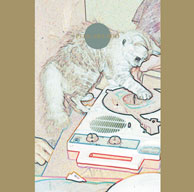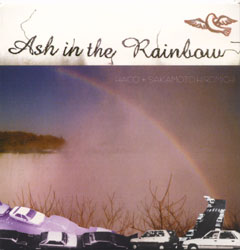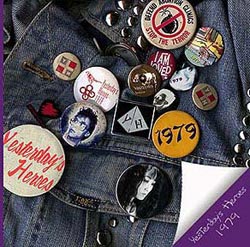Yesterday�s Heroes - 1979 �(La Louche)
 Without cutting short a 13-year career, singer and popstress Haco might have hit her peak with Ohayo! Hoahio!, released by Tzadik in 2000. Its blend of koto, sine wave, electronics and the catchy melodies she�s been mining since her days leading After Dinner was nearly perfect, more fully formed than Hoahio�s first disc and glossier than her previous projects.
Without cutting short a 13-year career, singer and popstress Haco might have hit her peak with Ohayo! Hoahio!, released by Tzadik in 2000. Its blend of koto, sine wave, electronics and the catchy melodies she�s been mining since her days leading After Dinner was nearly perfect, more fully formed than Hoahio�s first disc and glossier than her previous projects.
The group�s third record, Peek-ara-boo, finds Haco and Michiyo Yagi (one of the best avant koto player around, and there are others) joined by percussionist Mari Era, who takes the place of departed sine wave maven Sachiko M. With light percussion and ringing tones, Hoahio come off as more of a pop band, and unabashedly so. The album opens with the rocking groove �DJ Hashimoto,� which is as good as anything on Ohayo! From there they work more or less like the old band, with delicate koto songs, odd little interludes and great off-kilter pop, augmented by nice textures from the percussionist�s vibraphone, bass marimba and bamboo xylophone. Even with the bar as high as they set it, Peek-ara-boo more than satisfies.
 Haco is capable of gallons of tenderness and melancholy, and it�s in full effect on her collaboration with cellist and composer Hiromichi Sakamoto. Ash in the Rainbow is a set of songs she composed around Sakamoto�s 1999 album Zero-shiki, saying she found melodies buried within his sound constructions, and then remixed and edited it into a new work (bringing Mari Era in to round out the sound). His soundtracks are perfect for her sad songs, and the pairing works easily. Like Bjork or Tricky, Haco often floats her vocals above a soundscape with little or no direct musical support. The tracks aren�t far from Hoahio�s recordings, although occasionally � as on �Airhead� � she gets pushed in new directions. The strings, singing saws and electronic whooshes make Rainbow one of her best releases, and aside of After Dinner and Hoahio probably her best. In a just world, it would carry a �contains the hit single �Zero Hills� sticker on the shrinkwrap.
Haco is capable of gallons of tenderness and melancholy, and it�s in full effect on her collaboration with cellist and composer Hiromichi Sakamoto. Ash in the Rainbow is a set of songs she composed around Sakamoto�s 1999 album Zero-shiki, saying she found melodies buried within his sound constructions, and then remixed and edited it into a new work (bringing Mari Era in to round out the sound). His soundtracks are perfect for her sad songs, and the pairing works easily. Like Bjork or Tricky, Haco often floats her vocals above a soundscape with little or no direct musical support. The tracks aren�t far from Hoahio�s recordings, although occasionally � as on �Airhead� � she gets pushed in new directions. The strings, singing saws and electronic whooshes make Rainbow one of her best releases, and aside of After Dinner and Hoahio probably her best. In a just world, it would carry a �contains the hit single �Zero Hills� sticker on the shrinkwrap.
 Yesterday�s Heroes is a project perfectly realized by Haco and Terre Thaemlitz, although it is by it�s nature mediocre. The title, 1979, refers to the year we are to imagine the record came out, and on the title track (also �Yesterday�s Heroes,� a nod to band theme songs of the time) Haco intones �We don�t want to be/Yesterday�s heroes� over a scratchy �Whiter Shade of Pale� backing track. That spills into �New Wave, New Days,� the band�s icy call to arms. Elsewhere there are such small tributes as a Kraftwerkesque vocoder and a buried �O Superman� vocal pulse and plenty of vinyl pops. Haco and Thaemlitz have reimagined the forgotten bands of the 1980s (it sounds more like 1982 than 1979, but perhaps Yesterday�s Heroes are the fantasy forgotten forebears to groups like Altered Images, Missing Persons and Human Sexual Response). They work the beat-driven electronics and cold female vocals, the sort of stuff that would become alt dance music a few years later � in fact, what might have influenced After Dinner in the early �80s. There�s even an homage to their would-have-been followers Men Without Hats with a short, sparse cover of their �No Dancing.� Many�s the musician that goes back to their roots. In a curious way, Yesterday�s Heroes became them.
Yesterday�s Heroes is a project perfectly realized by Haco and Terre Thaemlitz, although it is by it�s nature mediocre. The title, 1979, refers to the year we are to imagine the record came out, and on the title track (also �Yesterday�s Heroes,� a nod to band theme songs of the time) Haco intones �We don�t want to be/Yesterday�s heroes� over a scratchy �Whiter Shade of Pale� backing track. That spills into �New Wave, New Days,� the band�s icy call to arms. Elsewhere there are such small tributes as a Kraftwerkesque vocoder and a buried �O Superman� vocal pulse and plenty of vinyl pops. Haco and Thaemlitz have reimagined the forgotten bands of the 1980s (it sounds more like 1982 than 1979, but perhaps Yesterday�s Heroes are the fantasy forgotten forebears to groups like Altered Images, Missing Persons and Human Sexual Response). They work the beat-driven electronics and cold female vocals, the sort of stuff that would become alt dance music a few years later � in fact, what might have influenced After Dinner in the early �80s. There�s even an homage to their would-have-been followers Men Without Hats with a short, sparse cover of their �No Dancing.� Many�s the musician that goes back to their roots. In a curious way, Yesterday�s Heroes became them.
-
Kurt Gottschalk
Comments and Feedback:



